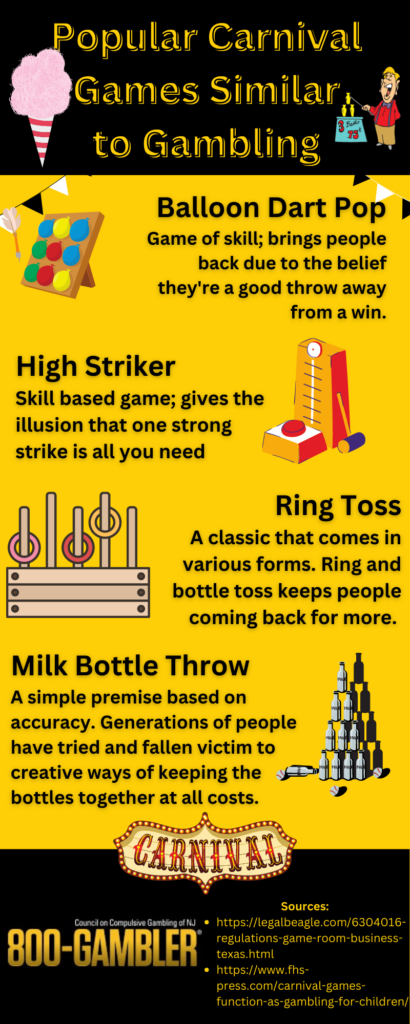For generations, county fairs and carnivals have been a major part of the American experience. People flock to the rides, attractions, and food for an afternoon of family fun and excitement. When you’re walking through the carnival grounds, you’ll quickly come upon various carnival games to keep you engaged and entertained. With a reputation for manufactured difficulty and addictive gameplay, these activities can consume a significant amount of your time — but is it gambling?
How Are Carnival Games Similar to Gambling?
At first glance, the assertion that carnival games are anything more than a quick distraction appears absurd. However, a closer look at the behaviors and the activities’ nature draws striking parallels.

Games of Skill
While not all gambling activities fall under the general category of games of skill, a range of them do. When it’s considered a skill-based activity over chance, regulators offer a little more leeway. These contests are presented as something players can win if they have enough skill to overcome the odds — much like carnival games.
While they aren’t as “rigged” as they once were, carnival-style games still offer that same illusion that you can win any match with enough skill instead of pure luck. Games of skill lure people into a never-ending feedback loop where they believe the next round will be their time and keep putting money down until they win.
Games of Chance
Some states will allow carnivals to utilize games of chance in their gaming activities. New Jersey is one of them, but requires operators to pay additional fees to run them based on the cash value of their prizes. Raffles, bingo, and casino games fall under this category and represent the first exposure to gambling activities for many of the younger patrons.
Does Early Exposure to Gambling Behavior Matter?
When you start discussing matters such as gambling and bankruptcy in Atlantic City, NJ, and the surrounding areas, finding the root cause of their habits rarely goes as far back as their childhood carnival adventures. However, this early exposure and general acceptance of gambling-like practices may have a lasting impact on their future.
Since most parents may not draw the correlation between carnival games and gambling, they may allow their children to continue putting money down on these games until they get a win. As they normalize this “pay till you win” mentality, impressionable children may take that lesson to heart, even subconsciously, and take that with them until they have the opportunity to gamble later in life.
Get the Help Your Need for Your Gambling Problem
Whether you received your first exposure to gambling from a slew of carnival games in your youth or daily fantasy sports betting in Monmouth County, NJ, finding the help you need can prove challenging. You want to find services that consider your needs and help you get a support system that can address your ongoing needs. 800-GAMBLER’s free and confidential 24/7 helpline is available to give you the support you need moving forward.
If you or someone you love needs help with a gambling problem, don’t hesitate to contact 800-GAMBLER today!



